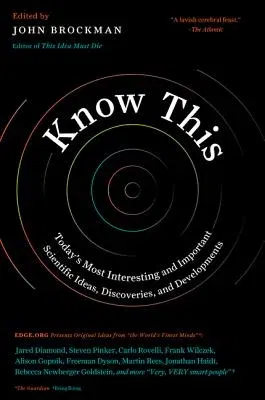Today's most visionary thinkers reveal the cutting-edge scientific
ideas and breakthroughs you must understand.
Scientific developments radically change and enlighten our understanding
of the world -- whether it's advances in technology and medical research
or the latest revelations of neuroscience, psychology, physics,
economics, anthropology, climatology, or genetics. And yet amid the
flood of information today, it's often difficult to recognize the truly
revolutionary ideas that will have lasting impact. In the spirit of
identifying the most significant new theories and discoveries, John
Brockman, publisher of Edge.org ("The world's smartest website" -- The
Guardian), asked 198 of the finest minds What do you consider the most
interesting recent scientific news? What makes it important?
Pulitzer Prize-winning author of Guns, Germs, and Steel **Jared
Diamond ** on the best way to understand complex problems * author of
Seven Brief Lessons on Physics Carlo Rovelli on the mystery of
black holes * Harvard psychologist Steven Pinker on the
quantification of human progress * TED Talks curator Chris J.
Anderson on the growth of the global brain * Harvard cosmologist
Lisa Randall on the true measure of breakthrough discoveries *
Nobel Prize-winning physicist Frank Wilczek on why the twenty-first
century will be shaped by our mastery of the laws of matter *
philosopher Rebecca Newberger Goldstein on the underestimation of
female genius * music legend Peter Gabriel on tearing down the
barriers between imagination and reality * Princeton physicist
Freeman Dyson on the surprising ability of small (and cheap)
upstarts to compete with billion-dollar projects. Plus Nobel laureate
John C. Mather, Sun Microsystems cofounder Bill Joy, Wired
founding editor Kevin Kelly, psychologist Alison Gopnik,
Genome author Matt Ridley, Harvard geneticist George Church,
Why Does the World Exist? author Jim Holt, anthropologist Helen
Fisher, and more.

